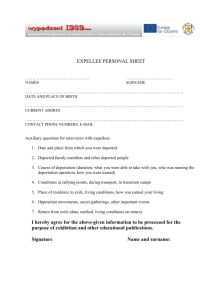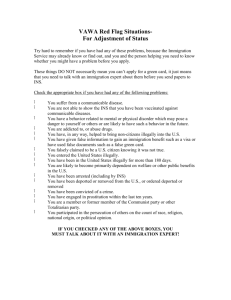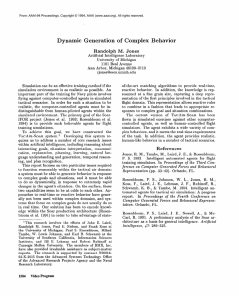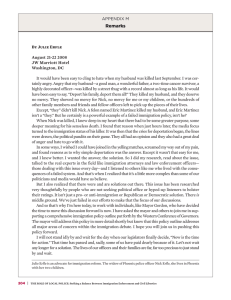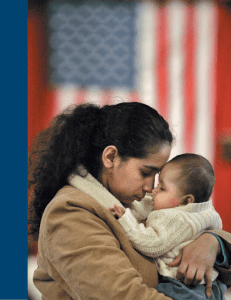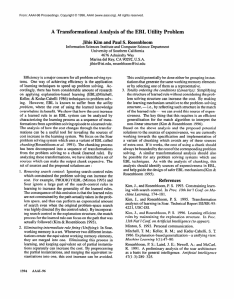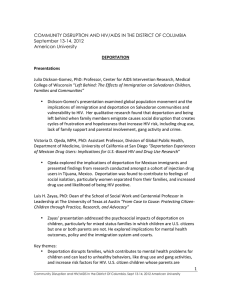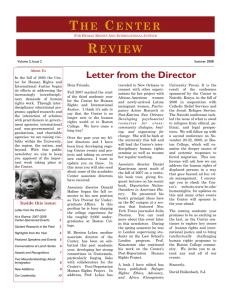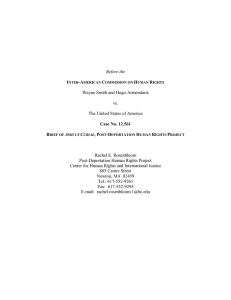I
advertisement
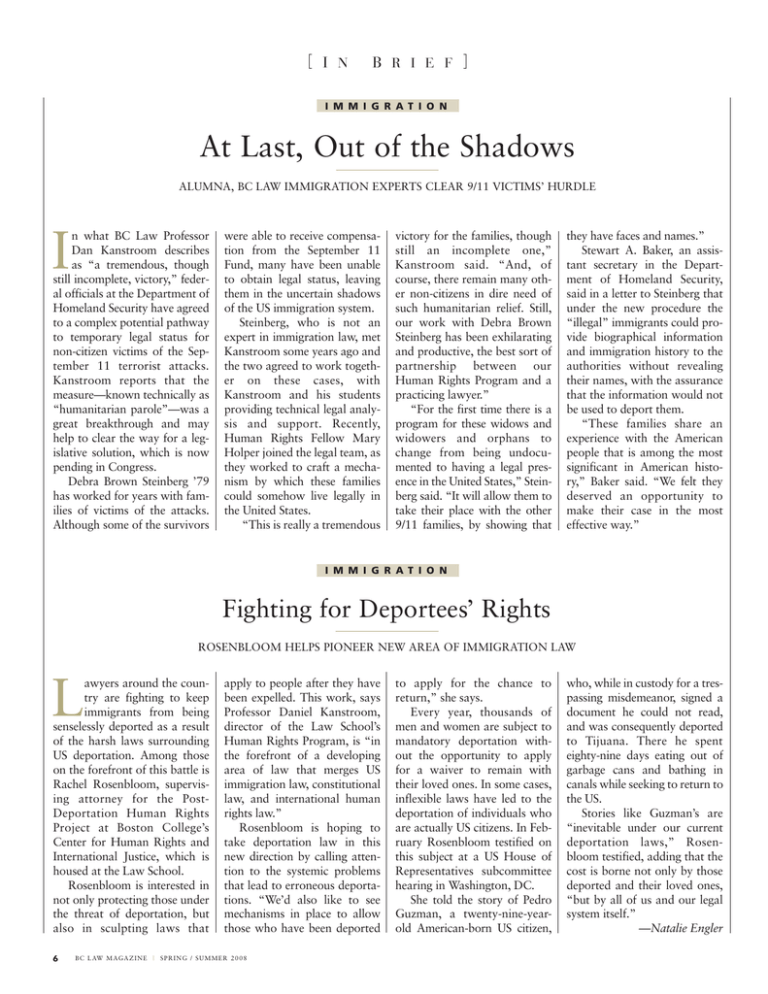
[ I N B R I E F ] I M M I G R A T I O N R At Last, Out of the Shadows ALUMNA, BC LAW IMMIGRATION EXPERTS CLEAR 9/11 VICTIMS’ HURDLE I n what BC Law Professor Dan Kanstroom describes as “a tremendous, though still incomplete, victory,” federal officials at the Department of Homeland Security have agreed to a complex potential pathway to temporary legal status for non-citizen victims of the September 11 terrorist attacks. Kanstroom reports that the measure—known technically as “humanitarian parole”—was a great breakthrough and may help to clear the way for a legislative solution, which is now pending in Congress. Debra Brown Steinberg ’79 has worked for years with families of victims of the attacks. Although some of the survivors were able to receive compensation from the September 11 Fund, many have been unable to obtain legal status, leaving them in the uncertain shadows of the US immigration system. Steinberg, who is not an expert in immigration law, met Kanstroom some years ago and the two agreed to work together on these cases, with Kanstroom and his students providing technical legal analysis and support. Recently, Human Rights Fellow Mary Holper joined the legal team, as they worked to craft a mechanism by which these families could somehow live legally in the United States. “This is really a tremendous victory for the families, though still an incomplete one,” Kanstroom said. “And, of course, there remain many other non-citizens in dire need of such humanitarian relief. Still, our work with Debra Brown Steinberg has been exhilarating and productive, the best sort of partnership between our Human Rights Program and a practicing lawyer.” “For the first time there is a program for these widows and widowers and orphans to change from being undocumented to having a legal presence in the United States,” Steinberg said. “It will allow them to take their place with the other 9/11 families, by showing that they have faces and names.” Stewart A. Baker, an assistant secretary in the Department of Homeland Security, said in a letter to Steinberg that under the new procedure the “illegal” immigrants could provide biographical information and immigration history to the authorities without revealing their names, with the assurance that the information would not be used to deport them. “These families share an experience with the American people that is among the most significant in American history,” Baker said. “We felt they deserved an opportunity to make their case in the most effective way.” I M M I G R A T I O N R Fighting for Deportees’ Rights ROSENBLOOM HELPS PIONEER NEW AREA OF IMMIGRATION LAW L awyers around the country are fighting to keep immigrants from being senselessly deported as a result of the harsh laws surrounding US deportation. Among those on the forefront of this battle is Rachel Rosenbloom, supervising attorney for the PostDeportation Human Rights Project at Boston College’s Center for Human Rights and International Justice, which is housed at the Law School. Rosenbloom is interested in not only protecting those under the threat of deportation, but also in sculpting laws that 6 apply to people after they have been expelled. This work, says Professor Daniel Kanstroom, director of the Law School’s Human Rights Program, is “in the forefront of a developing area of law that merges US immigration law, constitutional law, and international human rights law.” Rosenbloom is hoping to take deportation law in this new direction by calling attention to the systemic problems that lead to erroneous deportations. “We’d also like to see mechanisms in place to allow those who have been deported B C L AW M A G A Z I N E | S P R I N G / S U M M E R 2 0 0 8 to apply for the chance to return,” she says. Every year, thousands of men and women are subject to mandatory deportation without the opportunity to apply for a waiver to remain with their loved ones. In some cases, inflexible laws have led to the deportation of individuals who are actually US citizens. In February Rosenbloom testified on this subject at a US House of Representatives subcommittee hearing in Washington, DC. She told the story of Pedro Guzman, a twenty-nine-yearold American-born US citizen, who, while in custody for a trespassing misdemeanor, signed a document he could not read, and was consequently deported to Tijuana. There he spent eighty-nine days eating out of garbage cans and bathing in canals while seeking to return to the US. Stories like Guzman’s are “inevitable under our current deportation laws,” Rosenbloom testified, adding that the cost is borne not only by those deported and their loved ones, “but by all of us and our legal system itself.” —Natalie Engler
